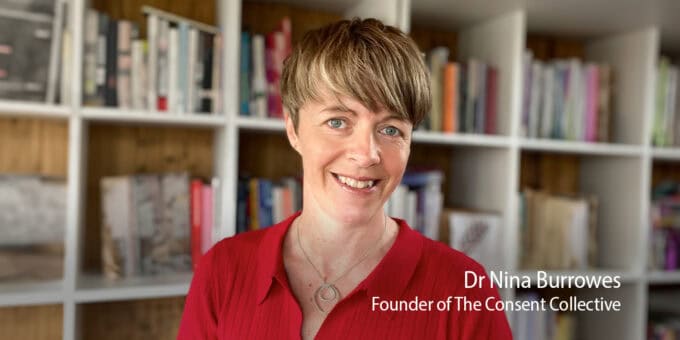In October 2024, the Worker Protection (Amendment of Equality Act 2010) Act 2023 will come into force. Under this new legislation, UK employers will have a legal duty to take ‘reasonable steps’ to prevent sexual harassment in the workplace. This marks a shift from reactive to proactive HR responsibilities.
Businesses and organisations of all sizes should prepare for these changes, from sole traders with only one or two workers to large limited companies with a sizeable workforce.
To help employers comply with this new duty and understand the changes to the law, the Equality and Human Rights Commission (EHRC) will release an updated version of its technical guidance on 26 September 2024.
Ahead of this, Psychologist Dr Nina Burrowes, founder of The Consent Collective, shares valuable insight and advice with Rapid Formations on creating a culture that can prevent sexual harassment from arising in the workplace.
Q: What is the Worker Protection Act, and what does it mean for employers?
A: The Worker Protection Act is an amendment of the Equality Act (2010). It states that employers must take reasonable steps to prevent sexual harassment of their employees in the course of their employment. This includes harassment by customers, clients, students and guests, as well as harassment by colleagues.
Failure to do so will result in higher financial penalties for cases taken to employment tribunals. The Act means that every business and organisation has a legal obligation to consider what it is actively doing to prevent sexual harassment from happening in the first instance.
Q: How important are policies and reporting processes in showing that you can comply with the new Act?
A: Many employers may instinctively look to review their policies and procedures in response to this new Act. When doing so, it can be useful to recognise that policies and reporting processes are a necessary but not sufficient part of complying with the Act.
Policies are important because they articulate your expectations to your staff, clients, and customers. It’s easier for people to meet those expectations if they are clearly communicated, along with an outline of what will happen if those expectations are not met.
The reporting process can also be important. People need to know what you, as an employer, want to be told about and how they can pass that information on to you.
However, policies and reporting processes are only a small part of the picture. They do very little to actually prevent sexual harassment from happening in the first place.
To illustrate that point, many organisations have stated they have a ‘zero tolerance’ stance towards sexual harassment, but this statement alone has been ineffective in preventing instances of sexual harassment. Prevention is about walking the talk.
Sexual harassment concerns relationships, power, difference and consent. I would say that the path to preventing sexual harassment lies 99% in your business culture and 1% in your policies and processes.
If you had the right workplace culture, the policies would be redundant, and people would feel comfortable reporting sexual harassment without the need for an expensive anonymous reporting process.
Q: Why is workplace culture so important?
A: Your people are your business. Regardless of what values or policies your organisation has written down, the lived reality of how people interact with each other has the most influence on what kind of organisation you are.
Historically, sexual harassers who intend to cause harm to colleagues have used workplace culture to their advantage. They’ve enjoyed a long period where people would turn a blind eye to their behaviour, laugh along instead of challenging their inappropriate language, or assume it’s someone else’s responsibility to step in.
Some sexual harassers cause harm without intending to do so. These people are out of date in how they interact with colleagues, are not good at noticing or reflecting on the impact of their behaviour, and think they’re being funny or charming when, in fact, they are harassing. They’ll often continue to cause harm if they’re in a workplace culture where no one gives them feedback about the impact of their behaviour.
This is why a huge part of preventing sexual harassment in workplaces relies on creating a culture where giving and receiving feedback about inappropriate behaviour is normal. To do this, everyone needs to feel equipped and supported to step in and act when they witness potential harassment.
This work is so much bigger than simply raising awareness. It’s about knowledge and skills, and having the confidence to put all of that into action when needed. It’s not about creating a culture where people throw accusations at each other.
Done well, this is a balancing act between having the courage to step in, the compassion to recognise that we’re all on a learning journey regarding appropriate ways to interact with others, and the robustness to hold those who cause harm accountable for their actions.
Q: What’s the difference between ‘awareness raising’ and ‘prevention’?
A: When we raise awareness, we often educate people about the nature, types, signs, and prevalence of sexual harassment. If we want to evaluate an awareness-raising campaign, we can measure whether people know more about the topic area after engaging with it.
With prevention, the bar is much higher. To build an impactful prevention campaign, we need to know why sexual harassment happens, what facilitates it, why people don’t step in to prevent it, and the changes that will most likely lead to a lasting positive impact. If we want to measure the impact, we’ll look to see if, over time, less sexual harassment happens.
To comply with the Worker Protection Act, it’s not just a case of asking ‘What are we doing?’ but also ‘Why would we expect that to prevent sexual harassment from happening in the first place?’
A huge part of this will be skills – not just knowledge. People need to know how to talk to their colleagues about their behaviour, understand consent, and reflect on their ability to give and receive feedback.
Q: What is the best way to do this kind of prevention work?
A: The best work happens when we’re inspired, connected with others, have the humility to look for gaps in our knowledge and build long-term change rather than looking for short-term fixes. This work is truly inspirational.
Yes, it’s about safety, which is such a basic thing to offer the people who come to work for you. But it’s also about living our values as people and organisations. Doing my job allows me to see what is possible when this work is done well.
When an organisation has the courage to create a culture that can respond to sexual harassment in a calm, compassionate, and robust way, the positive impact on the lives of the people in the workplace can be massive.
When this work is done well, there is a ripple effect. It’s truly an opportunity to develop skills, trust, and a culture of mutual investment.
That kind of work isn’t achieved by quick fixes or tick-boxes. I would invite employers to see the Worker Protection Act as an opportunity to walk the talk and put some of those company values into action.
Q: How do you help employers who want to prevent sexual harassment?
A: I’ve spent my whole career in the area of sexual harassment, working with perpetrators of harm, survivors of abuse, and organisations who want to create change.
At The Consent Collective, we bring that depth of knowledge, along with our breadth of experience, to help support workplaces that want to create a company culture where sexual harassment is prevented from happening.
We support our clients with a programme of work that educates and empowers every level of their business—from all staff to the HR team to senior management—to play their part in preventing sexual harassment.
We’re living and working in a time when we have the awareness, knowledge, and skill to do this meaningful and impactful work. Today, employers have a clear choice. When the next generation enters your industry, they could enter an industry free from sexual harassment. If you want to make that choice and create that change, we’ll support you every step of the way.
Thanks for reading
Dr Nina Burrowes is a psychologist and the founder of The Consent Collective. Her career has stretched across working with those found guilty of sexual offences, with victims of sexual crime, and with universities and workplaces that wish to prevent sexual harassment. Nina has provided training to police officers, barristers, judges, healthcare professionals, HR managers, and therapists.
To find out more about the range of online courses and live seminars that help prevent workplace sexual harassment, visit The Consent Collective website.
Please note that the information provided in this article is for general informational purposes only and does not constitute legal, tax, or professional advice. While our aim is that the content is accurate and up to date, it should not be relied upon as a substitute for tailored advice from qualified professionals. We strongly recommend that you seek independent legal and tax advice specific to your circumstances before acting on any information contained in this article. We accept no responsibility or liability for any loss or damage that may result from your reliance on the information provided in this article. Use of the information contained in this article is entirely at your own risk.












Join The Discussion
Comments (2)
Thanks for the article! This perspective on sexual harassment provided me with some policy ideas for my own business tax services UK.
Hi David,
Thank you for your kind comment!
We are pleased that this has provided you with a different perspective on the topic.
Kind regards,
The Rapid formations Team